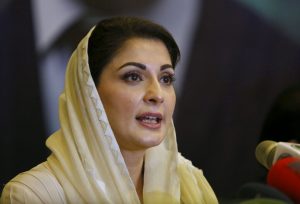Since Friday, Pakistan has seen two opposition rallies challenging the Imran Khan government as well as the iron grip of the Pakistan Army over the country’s political system. The protests mark the beginning of a period of significant political turmoil in the country as a united opposition presents significant challenges for both Khan as well as Pakistan Army Chief General Qamar Javed Bajwa.
On October 16, addressing the first rally of the 11 opposition parties Pakistan Democratic Movement (PDM) alliance in Gujranwala, a city in Pakistan’s Punjab province, through a video link from London, Pakistan Muslim League (N), or PML-N, leader Nawaz Sharif doubled down on his attack on the Pakistan army, naming both Bajwa as well as Lieutenant General Faiz Hameed, the chief of the powerful Inter-Services Intelligence (ISI), as the orchestrators of Khan’s election in 2018. “Gen. Qamar Javed Bajwa ended my government. He rigged 2018 elections and imposed incapable Imran Khan on the nation. Gen. Bajwa is a direct culprit and he will have to give an answer to this,” Sharif said, adding that Hameed was also behind both.
While this is not the first time Sharif has accused the army of meddling in Pakistan’s politics – he took aim at that institution at a multiparty meeting last month that also saw the creation of the PDM – this is the first time he had mentioned Bajwa and Hameed by name.
The PDM staged another rally, in Karachi, Pakistan’s commercial capital, on October 18. As the Dawn reported, unlike the Gujranwala rally which was revolved around the PML-N, the Karachi rally had the Pakistan’s Peoples Party (PPP) in focus. It also coincided with the 13th anniversary of an attack in that city on PPP leader and former Prime Minister Benazir Bhutto. At the October 18 rally, which also saw Jamiat-Ulema-i-Islam (F) supremo and PDM chief Fazlur Rehman take potshots at Khan, Bhutto’s son and PPP chair Bilawal Bhutto-Zardari said Khan should remember the “life and fate” of other dictators, going on to add, “Your fate would not be different from them.”
The PML-N was represented by Sharif’s daughter and party leader Maryam Nawaz and her husband Safdar Awan, a retired army captain, among others. In a dramatic turn of events, Maryam Nawaz tweeted on the morning of October 19 that “Police broke my room door at the hotel I was staying at in Karachi and arrested Capt Safdar.” Since then, news has emerged that Awan was arrested for “violating the sanctity” of Muhammad Ali Jinnah’s mausoleum in the city; Jinnah is considered the founder of modern Pakistan. Earlier on October 18, Awan had raised political slogans at the mausoleum. Pakistani journalist Hamid Mir tweeted earlier today that Awan was arrested by Sindh police at the behest of the army.
Earlier this month, on October 5, Punjab police registered a case against Nawaz Sharif, his daughter Maryam, and other PML-N leaders on a host of charges, including “conspiracy to wage war against Pakistan,” “condemning the creation of the country and advocating the abolishment of its sovereignty,” and sedition.
Despite the opposition’s renewed push against Khan and the Pakistan army, political observers remain skeptical that it will be able to affect change in Islamabad. Questions have also been raised about PDM chief Rehman’s bona fides as a leader committed to democracy. One possibility opposition alliance members have to seriously consider is that of defection. It could be that, in the event the army wants to jettison Khan, Rehman would be installed in power by the army, effectively having piggybacked on other parties’ support through the current movement. Similarly, as the Dawn noted, the Karachi rally saw Maryam Nawaz adopt a conciliatory tone towards the army, unlike her father. There is, therefore, an analogous albeit remote, possibility that she, if not her father, may also cut a deal with the military at some point in the future.
The best scenario for many – that the Pakistan army will retire to the barracks once and for all following the PDM’s push since last month – is as enticing as it is remote.

































